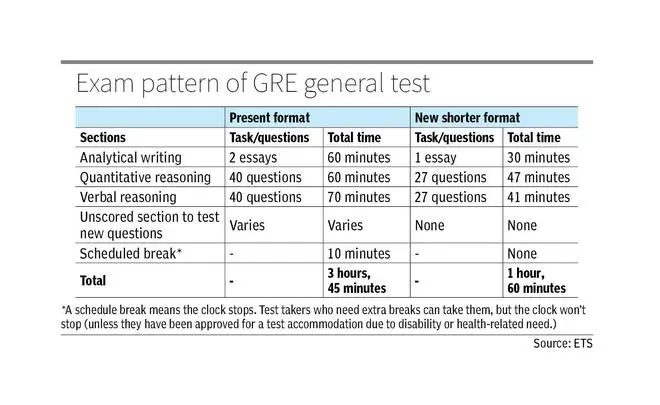From this September, the GRE General Test, the world’s most widely used test for admission to graduate and professional programmes, will take less than two hours to complete — half the time of the current test.
Announcing changes to the format of the test, Educational Testing Service (ETS) said it would now become the shortest and most efficient test among top graduate, business and law school admissions. Changes to the test include reduced number of questions in the quantitative and verbal reasoning sections, removal of the unscored section and removal of analysis of an argument in the analytical writing sections.

In an email interview with businessline, Alberto Acereda, Associate Vice-President of Global Higher Education, ETS, explained the rationale behind the changes
What prompted these changes? Was there a demand from institutions or students?
Our decision to shorten the GRE was informed by valuable feedback from institutions and students, alike. Over time, we have engaged in extensive conversations and conducted thorough research to understand the evolving needs and preferences of both groups. The input we received emphasised the importance of a test format that allows students to showcase their abilities effectively while minimising the strain that comes from a longer exam.
These changes also are the result of our analysis and discussions done with our assessment development and psychometrics teams about how we could introduce a better experience for test-takers, while retaining the strong validity and reliability schools need for confident decision-making.
By reducing the test duration to less than two hours, we aim to strike a balance between providing a comprehensive assessment and ensuring a manageable testing experience for students.
With the GRE General Test now being roughly half the time of the current test, this enables students to have more time to focus on other parts of their application and getting into their preferred graduate-level program.
How many institutions in India rely on GRE? Has there been a growth in the figure?
In India, 100+ institutions, including 30+business schools rely on GRE scores for admissions to their graduate, business and law programmes. We expect these numbers to grow with our local presence through ETS India. Indian learners benefit from a local team dedicated to serving them across their learning journey.
We also look forward to continuing our close collaboration with the members of India Business School Advisory Council. Together, we will focus our efforts on how we can unlock value and opportunities for Indian B-schools and students.The GRE exam continues to grow in its acceptance and popularity internationally with more than 1,300 B-schools around the world accepting GRE scores.
What impact will these changes have in GRE scores — do you expect a drop or rise in the average scores?
The shorter GRE will have fewer questions than the current GRE, while keeping content the same. Since we are not eliminating any content area, the shortened test measures the same construct as the current test. We are shortening the test in a way that retains an appropriate level of reliability and validity for admissions. Hence we do not anticipate major shifts in the distribution of scores and will analyse the new data yielded by the test soon after it is rolled out to assess any possible shifts that might arise.
What is the current average score? What is a good score to get admission in top universities?
The average GRE General Test scores are 151.3 for verbal reasoning, 157.0 for quantitative reasoning and 3.4 for analytical writing. Admissions requirements vary from university to university, and even from programme to programme. We encourage learners to explore admissions requirements, which are generally posted on university websites, so they can prepare accordingly.







Comments
Comments have to be in English, and in full sentences. They cannot be abusive or personal. Please abide by our community guidelines for posting your comments.
We have migrated to a new commenting platform. If you are already a registered user of TheHindu Businessline and logged in, you may continue to engage with our articles. If you do not have an account please register and login to post comments. Users can access their older comments by logging into their accounts on Vuukle.